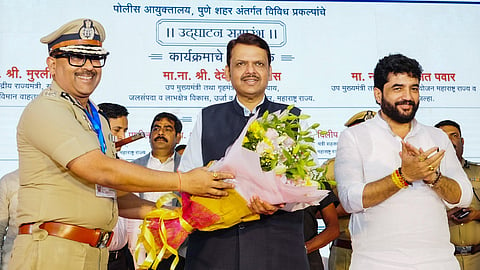

Pune: In response to the growing traffic congestion in Pune city, Maharashtra Home Minister Devendra Fadnavis has announced the appointment of an Additional Commissioner of Police and two Deputy Commissioner of Police (DCP) to manage traffic more effectively.
This significant decision follows discussions with the city's Police Commissioner, as the rapid increase in vehicles has made it necessary to strengthen the city's traffic management system.
Currently, Mumbai is the only city in Maharashtra with an Additional Police Commissioner dedicated to traffic management, along with multiple Deputy Commissioners. Fadnavis' announcement marks a significant move for Pune, highlighting the city’s increasing infrastructural demands.
The decision was revealed during the inauguration ceremony of various projects under the Pune Police Commissionerate, which have been recently approved with a budget of ₹720 crore.
The ceremony took place on Friday (October 11) at the Shivajinagar Police Headquarters, where Union Minister of State Murlidhar Mohol, MP Medha Kulkarni, and Pune Police Commissioner Amitesh Kumar were present.
Fadnavis also inaugurated seven new police stations in Pune on the same day, setting a record for the state. This move comes after 63 years of no structural changes in the police force's organizational setup.
According to Fadnavis, the growing population and rising security needs necessitated a reevaluation of police resources, leading to the creation of a new organizational structure that includes a fresh assessment of police station requirements and personnel distribution.
Fadnavis further explained that there had been an unofficial hold on building new police stations in the state until 2014 when his administration took charge of the Home Ministry.
Since then, new stations have been established in various regions, and the inauguration of seven stations in Pune represents a key moment in that effort.
In addition, Fadnavis noted that during his tenure, 40,000 new personnel have been recruited into the police force, which he described as a qualitative transformation aimed at improving public safety.
